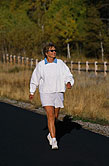- Could Artificial Sweeteners Be Aging the Brain Faster?
- Techniques for Soothing Your Nervous System
- Does the Water in Your House Smell Funny? Here’s Why
- Can a Daily Dose of Apple Cider Vinegar Actually Aid Weight Loss?
- 6 Health Beverages That Can Actually Spike Your Blood Sugar
- Treatment Options for Social Anxiety Disorder
- Understanding the Connection Between Anxiety and Depression
- How Daily Prunes Can Influence Cholesterol and Inflammation
- When to Take B12 for Better Absorption and Energy
- Epsom Salts: Health Benefits and Uses
2-Minute Walk Every Hour May Help Offset Effects of Sitting


Getting up and walking for two minutes every hour could help reverse the negative health effects from prolonged sitting, new research suggests.
Previous studies have shown that sitting for extended periods of time every day can increase the risk of a number of health issues, such as heart disease, diabetes and premature death.
Current exercise recommendations advise adults to get at least 2.5 hours of moderate physical activity each week. But 80 percent of Americans don’t meet this goal.
The new findings — if confirmed — suggest that even small periods of light activity offer health benefits.
“Exercise is great, but the reality is that the practical amount of vigorous exercise that can be achieved is limited. Our study suggests that even small changes can have a big impact,” said senior study author Tom Greene. He is director of the Study Design and Biostatistics Center at the Center for Clinical and Translational Science at the University of Utah School of Medicine in Salt Lake City.
The findings were published online April 30 in the Clinical Journal of the American Society of Nephrology.
The study used data from more than 3,200 people who participated in the U.S. National Health and Nutrition Examination Survey. The study volunteers wore devices to measure the intensity of their activities.
The researchers compared the health benefits of longer bouts of low-intensity activities, such as standing, with light-intensity activities, such as walking.
The study participants were followed for three years. During that time, 137 of the people died.
The study found that standing more may not be enough to offset the dangers of sitting for too long, but short bursts of light activities, such as walking, cleaning and gardening, can boost the longevity of people who are sedentary for more than half of their day.
Trading two minutes of sitting for two minutes of light-intensity activity each hour lowered the risk of premature death by 33 percent, the study revealed.
“It was fascinating to see the results because the current national focus is on moderate or vigorous activity. To see that light activity had an association with lower mortality is intriguing,” study lead author Dr. Srinivasan Beddhu, a professor of medicine at the university, said in a university news release.
Over the course of days and weeks, the beneficial effects of walking can add up and help sedentary people get closer to the weekly recommendation for exercise, the researchers explained.
“Based on these results, we would recommend adding two minutes of walking each hour in combination with their normal activities, which should include 2.5 hours of moderate exercise each week,” said Beddhu. Moderate exercise strengthens the heart, muscles and bones, and confers health benefits that low and light activities can’t, according to background information in the news release.
More information
The American Heart Association has more on the benefits of walking.
Source: HealthDay
Copyright © 2026 HealthDay. All rights reserved.










